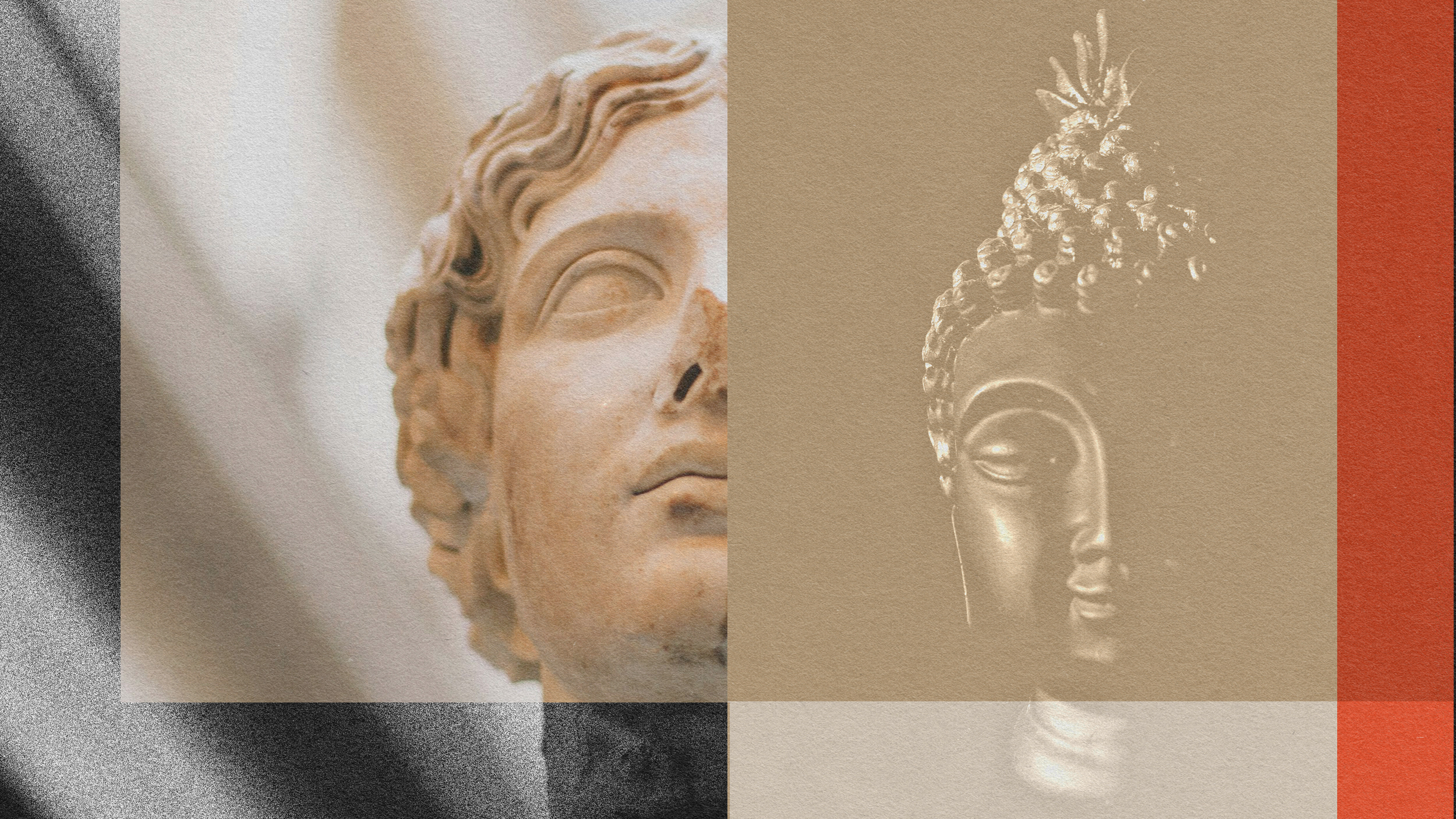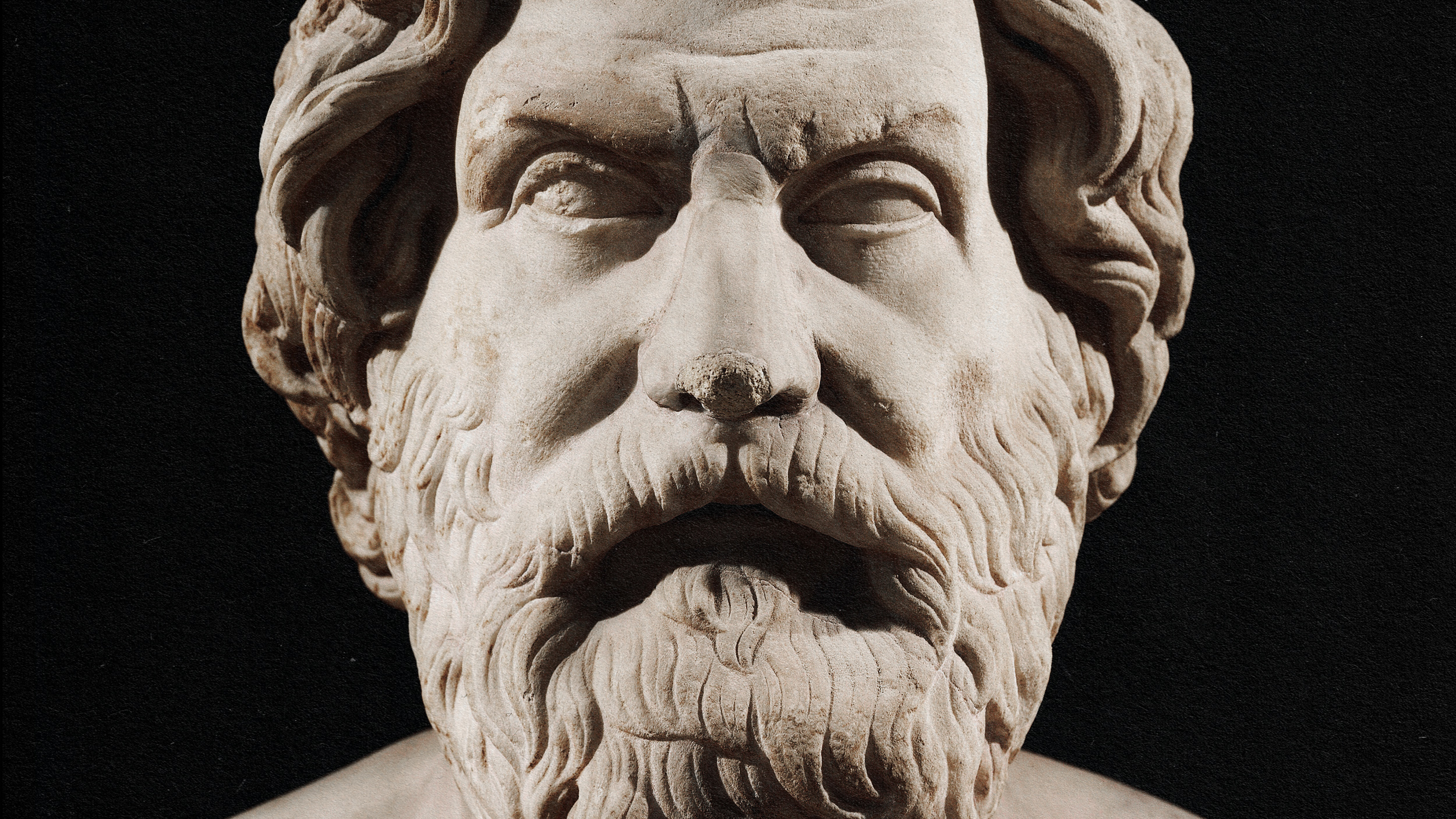3 clues that Stoicism is a religion in disguise

- It’s long been observed that there is a decline in religious belief in the West. It’s also been observed that Stoicism is on the rise.
- Stoicism is a complete philosophy of life — a philosophical system with a metaphysics, an ethics, and meditations or exercises.
- Big Think spoke with Stoicism expert Massimo Pigliucci about his new book and whether Stoicism makes sense without its more religious elements.
For most of human history, we’ve lived in the shadow of the gods. Every century before ours was a far, far more religious one. People would pray daily to divinities that were never far away. They would see the divine in everything. Gods made the world, and that made the world meaningful. Religious systems answered questions like how to behave and why to bother. Things were defined by certain foundational metaphysical commitments: Jannah, Hell, Samsara, Jīva, or whatever. Everything and everyone orbited a religious star.
Today, things are different. Atheism, in its multiple definitions, is on the rise. Religious attendance is down, secular philosophy is up, and the scientific worldview has booted the spiritual ones off center stage. And that poses a problem. For a species that has spent hundreds of thousands of years in step with a certain way of life, it takes some time to reorient itself. It takes a bit of work to stitch up a traumatic rupture. When Friedrich Nietzsche said, “God is dead,” in the next breath he said, “What next?” What will replace the hand that has led us for so long?
To fill that God-sized hole, some have argued that modernity dabbles with surrogates for religion. We make, for example, a church of sport — with schisms, heretics, and holy wars. We find transcendence in music, the arts, or drugs. We find community in our phones and ritual in our obsessions. But each falls a bit flat. These surrogates may satisfy one or another of the godless needs, but they lack the cohesive wallop of a system. They do not provide the meaning and commitment required for a real religion — failing to answer all of life’s problems.
The Stoic religion?
In parallel to these issues is an interesting, correlative phenomenon: the resurrection of Stoicism. As someone who makes a living out of being a public philosopher, I’ve noticed how often and easily people label things as “a bit like Stoicism.” Anything good, useful, or deep is called Stoic. In many circles, Stoicism has become synonymous with “philosophy” more broadly.
So, we have two observations here: First, a crisis in meaning — an existential ennui or sociological anomie. (French words are always pretentiously useful in these kinds of discussions.) Second, Stoicism is popular and becoming more so. Now, correlation does not equal causation, and these observations could happily live unconnected. The decline of religion in the West and the rise of Stoicism may be as unrelated as the spread of Wi-Fi and the disappearance of phone booths. Still, I think it deserves a bit of investigation, at the very least.
That’s why I recently spoke with the philosopher Massimo Pigliucci about his new book Beyond Stoicism: A Guide to the Good Life with Stoics, Sceptics, Epicureans, and Other Ancient Philosophers. We talked about the limits of Stoicism, the appeal of its ancient rivals, and the question, “Is Stoicism a religion?”
The 3 elements of a system
There is a difference between a philosophy and a philosophy of life. Most modern philosophers focus on a few incredibly specialized corners of philosophy. They’ll examine an issue in epistemology, logic, ethics, mind, or whatever, and that’s where they’ll stay. The ancient world was different. The Greek and Roman philosophers — as well as the analogs in China and the Indian Subcontinent — were concerned with systems of philosophy. They wanted a philosophy of life.
“A philosophy of life has to have three components,” Pigliucci said. “It has metaphysics — meaning a picture of how the world works and how the world hangs together, so to speak. It has an ethics — that is, an idea of how you should live in that world. And then it has a set of practices, meditations, and exercises of different kinds. And those are meant to help you out [in] implementing your ethics. And now, if you think about it, religions have all those three, right?”
“Let’s say, let’s say Christianity, which is the religion, as I said, that I grew up with. Well, metaphysically speaking, the world was created by an all-powerful God, and so on. Then, from a point of view of ethics, of course, there’s the Ten Commandments, teachings of Jesus and of the apostles, etc. And then, in terms of practices, you pray, you reflect on scriptures, you engage in community and communal activities, you go to church, etc. I could do the same thing with Buddhism, Confucianism, or whatever else. So, I think that there is a broad category there of aspects of ways of life that are philosophically informed, and religions are a large subcategory of that general way of looking at things.”
The metaphysics of Stoicism
So, if religions have three elements, and ancient Stoicism has those elements, it would seem fair to conclude that ancient Stoicism, at least, was a religion. But for many people today who are only loosely familiar with Stoicism, the metaphysical elements might not be so obvious. People are often introduced to Stoicism through disembodied quotes floating around social media, or “life-pro tips” to help you get by. They’ll know it from cognitive behavioral therapy or when looking for self-improvement tips. As such, they’ll probably only come to associate Stoicism with its practices and meditations.
Metaphysical commitments are the kinds of things that many nonreligious people, especially those stewed in a scientific worldview, find hardest to swallow. It’s the belief in a soul, an afterlife, an interventionist God, or some karmic force like samsara. In Stoicism, the metaphysical commitment is in the underlying force known as logos, or rationality. According to Pigliucci, however, this is a different kind of metaphysics to “other” religions.
“Here, the relationship between faith and reason is different. Typically, in a religion, metaphysics is about faith. And reason comes in as sort of, so to speak, as the handmaiden of faith. So, it’s reason; it’s fine so long as it agrees with the faith. If it doesn’t, then we’ve got trouble. In the case of philosophy, it’s the opposite. There is no faith. The Stoics didn’t go out there and pray to Zeus or anything like that. It’s all about reason because it is a philosophy, first.”
“For instance, Stoicism assumes that metaphysically the world is a living organism, which they call God, which is endowed with the logos. Okay, but that’s an empirical proposition. It’s not an article of faith. And in fact, as it turns out, as a modern scientist myself, I look at that proposition and I say, ‘No, I don’t think so.’ I’m a biologist. I don’t see anything in the Universe at large that looks like a living organism to me. I don’t see any reason or evidence to think that way.”
Stoicism without metaphysics
Ancient Stoicism, then, seems to look a lot like a religion — with the usual three elements included. But is it possible to extract a form of Stoicism without the metaphysical elements? Can we take the ethics and the practices without the logos? Can we have a secular Stoicism like some people try to have a secular Buddhism? Pigliucci thinks not.
“Okay, but then what happens to Stoicism if you drop certain metaphysical components? Something does happen, because the metaphysical notion of the living cosmos of which we are literally bits and pieces, like cells of an organism, does have major implications for Stoic providence. So, a Stoic like Epictetus says, ‘At night, don’t forget to kiss goodbye to your wife and your child because they might be dead. And if you remind yourself of that, then you will not suffer.’ But, reading that, I say, ‘Wait a minute. Hold on. What do you mean when you say I will not suffer?’”
“Well, from his point of view, that’s perfectly right. If you think of everyone, including your loved ones and yourself, as a cell of a gigantic organism whose interest you’re serving, you understand that if something happens to you, including losing your loved ones, it’s not bad. It’s actually good. It serves the purpose, you know, the greater purpose of the Universe.”
“So, you should actually feel good about it, right? Great. But what happens if you don’t think that that is the big picture of the world? Right, well, now you have to reexamine things. And in that particular case, I think we are left with acceptance and endurance rather than embracing your fate. So, the Stoics were about embracing your fate, or, as Nietzsche famously put it much later on, ‘amor fati’ or love your fate.”
“But, no, I can’t live for my fate because I think fate is not providential. Fate is just neutral. The Universe doesn’t care about me. So bad things do happen to people, but I look at it from the Stoic perspective of accepting the facts for what they are and doing your best with what the Universe provides you with. And I’m still left with acceptance and endurance.”
The ethical Stoic
For Pigliucci, much of the ancient Stoics’ acceptance comes from their foundational, metaphysical commitments. When we take that away, we’re left not with a “love of fate” or a “trust in the divine plan,” but rather a tool for endurance. But what about Stoics’ ethical commitments? What about the Stoic idea that a life of virtue is the best and most fulfilled? Can we salvage that from its underlying religious belief? It’s difficult.
A lot of the Stoic emphasis on virtue — such as the four cardinal virtues of practical wisdom, justice, courage, and temperance — is framed within a certain belief in the summum bonum, or the “greatest good.” Stoicism starts with the basic belief that the greatest good in life is virtue. But it’s debatable how true that is.
“So that’s one of the main reasons we wrote the book in the first place,” says Pigliucci. “And I think it is one of the things that the Greco-Roman tradition did get wrong. Most of them, with some exceptions, had one major assumption. It was the underlying assumption of almost everybody in the ancient world, and that was that there was going to be only one answer to ‘What is the highest good?’ right? It’s either virtue or pleasure or something else, but it can’t be a combination of things because a combination will bring trade-offs. And the reason you cannot be a Stoic and an Epicurean at the same time is because for a Stoic, the highest good is virtue. For an Epicurean, the highest good is tranquility of mind, or ataraxia.”
Salvaging a secular Stoicism
Can we carry on being Stoics without these foundational metaphysical commitments or basic beliefs? Can we appreciate the advice of Epictetus without accepting the metaphysics of the logos, and can we meditate according to Marcus Aurelius without believing there is only one greatest good?
Pigliucci thinks so. After all, Stoicism still has a whole range of psychological benefits.
“We know Stoic exercises work because they have been the initial inspiration for cognitive behavioral therapy back in the late ’50s and early ’60s. Both Aaron Beck and Albert Ellis, the two people that basically got CBT started, were both inspired by Epictetus and Marcus Aurelius mostly, and they explicitly say so. Now, of course, CBT is a therapy, not a philosophy or a life.”
And so we come full circle. If Stoicism is to be more than simply a menu of useful tricks and psychological meditations to help us get by, then it needs the basic beliefs mentioned above. If we are to find meaning, purpose, and direction in life, we need to accept ancient Stoicism in its full richness. We need to recognize the ancient allure of the logos and unpack what the greatest good of virtue really means.
That might not be for everyone. Not everyone likes seeing Stoicism as a religion, and of course, that’s okay. Pigliucci’s latest book is a fantastic and highly readable exploration of the different ancient philosophies available, and it settles on a kind of balance. We need virtue, sure, but we also need pleasure and epistemic humility. Explore philosophy and find something that works for you. Take what you need. Do whatever you can to get by and to get better.





